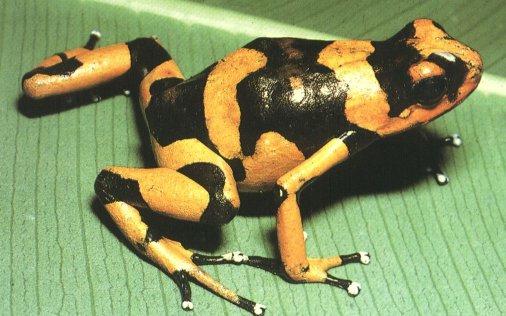|
| 질의: black toad | 결과: 34번째/35 | |
Yellow-banded Poison Dart Frog (Dendrobates leucomelas) (금줄독개구리)
| 제목: | Yellow-banded Poison Dart Frog (Dendrobates leucomelas) (금줄독개구리)
| |

| 해상도: 506x316
파일크기: 39819 Bytes
등록시간: 2005:02:24 19:43:25
|
From: Bug-a-Boo@don'tmindme.com
Newsgroups: alt.binaries.pictures.animals
Subject: Frog -- - poisfrg0.jpg (1/1)
Date: Tue, 17 Sep 1996 15:37:31 GMT
Comments
========
From: phoby
Date: Tue Aug 31 10:27:32 KST 1999
File To Comment: animal4/poisonFrog0.jpg
This looks like a Panamanian golden frog to me?
Comments
========
From: AATate@aol.com
Date: Fri Oct 29 15:02:55 KST 1999
File: animal4/poisonFrog0-Panamanian_Golden_Frog.jpg
I think this is most likely Dendrobates leucomelas, yellow-banded poison dart frog. The color pattern is very similar to Panamanian Golden Frog, Atelopus
(which is actually in the toad family). But the proportions (e.g., short snout), and especially the all-black eye, give it away as a dendrobatid.
Any real experts out there, please help out.
|
댓글 |
|---|
| | 손님 |
|
| i dont know what you guys are talking about |
^o^
동물그림창고 똑똑전화 누리집
^o^
|
|
|